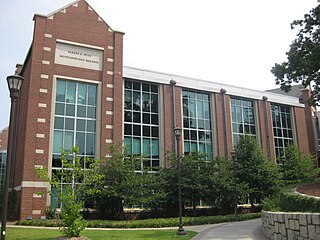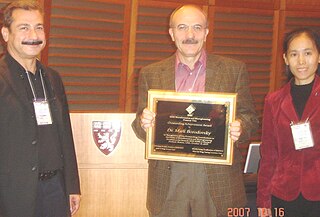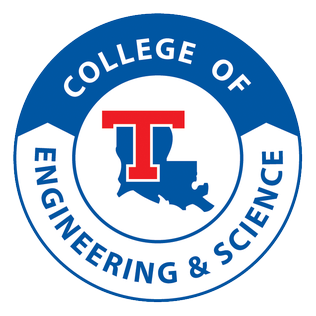
Biomedical engineering (BME) or medical engineering is the application of engineering principles and design concepts to medicine and biology for healthcare purposes. BME is also traditionally known as "bioengineering", but this term has come to also refer to biological engineering. This field seeks to close the gap between engineering and medicine, combining the design and problem-solving skills of engineering with medical biological sciences to advance health care treatment, including diagnosis, monitoring, and therapy. Also included under the scope of a biomedical engineer is the management of current medical equipment in hospitals while adhering to relevant industry standards. This involves procurement, routine testing, preventive maintenance, and making equipment recommendations, a role also known as a Biomedical Equipment Technician (BMET) or as clinical engineering.
The UC Davis College of Engineering is one of four undergraduate colleges on the campus of the University of California, Davis. One of the largest engineering programs in the U.S., the UC Davis College of Engineering offers 11 ABET-accredited undergraduate engineering majors. The college offers majors from a broad scope of engineering disciplines, including aerospace science, biochemical, biological systems, biomedical, chemical, civil, computer science, electrical, materials science, and mechanical engineering.
James Donald Meindl was director of the Joseph M. Pettit Microelectronics Research Center and the Marcus Nanotechnology Research Center and Pettit Chair Professor of Microelectronics at the Georgia Institute of Technology in Atlanta, Georgia. He won the 2006 IEEE Medal of Honor "for pioneering contributions to microelectronics, including low power, biomedical, physical limits and on-chip interconnect networks.”
The College of Engineering at the Georgia Institute of Technology provides formal education and research in more than 10 fields of engineering, including aerospace, chemical, civil engineering, electrical engineering, industrial, mechanical, materials engineering, biomedical, and biomolecular engineering, plus polymer, textile, and fiber engineering. The College of Engineering is the oldest and largest college of the institution.
North Carolina State University's College of Engineering (CoE) is the flagship college of engineering in the state of North Carolina and the largest college at North Carolina State University in terms of enrollment, followed by CHASS, with 9 core departments and 3 affiliated departments offering 18 bachelor's, 17 master's and 13 doctoral degrees. The College is the fourth largest college of engineering in the nation. The college's Engineering Online has one of the largest enrollments of any online engineering program in the U.S. and is consistently listed as a "Best Value" in online engineering education by GetEducated.com.

The Wallace H. Coulter Department of Biomedical Engineering is a department in the Emory University School of Medicine, Georgia Institute of Technology's College of Engineering, and Peking University College of Engineering dedicated to the study of and research in biomedical engineering, and is named after the pioneering engineer and Georgia Tech alumnus Wallace H. Coulter. The graduate program has consistently ranked 2nd in USNWR rankings, while the undergraduate program ranks 1st in USNWR rankings.

Nicholas (Nikolaos) A. Peppas is a chemical and biomedical engineer whose leadership in biomaterials science and engineering, drug delivery, bionanotechnology, pharmaceutical sciences, chemical and polymer engineering has provided seminal foundations based on the physics and mathematical theories of nanoscale, macromolecular processes and drug/protein transport and has led to numerous biomedical products or devices.

Mark Borodovsky is a Regents' Professor at the Join Wallace H. Coulter Department of Biomedical Engineering of Georgia Institute of Technology and Emory University and Director of the Center for Bioinformatics and Computational Genomics at Georgia Tech. He is also a Chair of the Department of Bioinformatics at the Moscow Institute of Physics and Technology in Moscow, Russia.
Don P. Giddens was the Dean of the College of Engineering at the Georgia Institute of Technology from 2002 to 2011. He is father of Olympic athlete Eric Giddens.

The College of Engineering and Science (COES) is one of five colleges at Louisiana Tech University. The roots of the College date back to the founding of Louisiana Tech in 1894 when the Department of Mechanics was created. Today, the college includes twenty-five programs, fourteen undergraduate, seven master's, and four doctoral programs. College programs are located on the Louisiana Tech campus in Ruston, Louisiana. In addition, courses are offered at the CenturyLink Headquarters in Monroe, Louisiana, at Barksdale Air Force Base, in Bossier City, Louisiana, and at the Louisiana Tech Shreveport Center, in Shreveport Louisiana.

Younan Xia is a Chinese-American chemist, materials scientist, and bioengineer. He is the Brock Family Chair and Georgia Research Alliance (GRA) Eminent Scholar in Nanomedicine in the Wallace H. Coulter Department of Biomedical Engineering, with joint appointments in the School of Chemistry & Biochemistry, the School of Chemical & Biomolecular Engineering, and Parker H. Petit Institute for Bioengineering & Bioscience at the Georgia Institute of Technology.

The University of Massachusetts Amherst College of Engineering is one of the schools and colleges at the University of Massachusetts Amherst. It was established on September 1, 1947 as the School of Engineering and now considered as the best public engineering school in New England, enrolling 2250 undergraduate students and 610 graduate students including 300 M.S. students and 310 Ph.D. students for the 2018–2019 school year. The College of Engineering at UMass Amherst has eight buildings, including the Elab II, research facilities, computer labs, and graduate offices. It has more than 16,000 living alumni around the world.
Ravi V. Bellamkonda is an Indian-American biomedical engineer and provost of Emory University.
The Johns Hopkins University Department of Biomedical Engineering has both undergraduate and graduate biomedical engineering programs located at the Johns Hopkins University in Baltimore, Maryland,

Jonathan S. Lewin is an American neuroradiologist specializing in medical imaging research with an emphasis on the investigation, development, and translation of new magnetic resonance imaging (MRI) techniques. He serves as executive vice president for health affairs (EVPHA) for Emory University, executive director of the Woodruff Health Sciences Center, and CEO and chairman of the board of Emory Healthcare. He is also professor of both radiology and imaging sciences and of biomedical engineering in the Emory School of Medicine and professor of health policy and management in the Rollins School of Public Health.
Kathryn Radabaugh Nightingale is an American biomedical engineer in the field of medical ultrasound. She is the Theo Pilkington Professor of Biomedical Engineering at Duke University in Durham, North Carolina. Nightingale is also a Member of the Duke Cancer Institute and Bass Fellow in the Duke University Pratt School of Engineering.
Elisa Konofagou is a Greek biomedical engineer in the field of medical ultrasound. She is the Robert and Margaret Hariri Professor of Biomedical Engineering and Radiology (Physics) at Columbia University in New York. Konofagou is a fellow of the Acoustical Society of America and the American Institute for Medical and Biological Engineering, and she received the NSF CAREER Award in 2007.
Manu Omar Platt is an American biomedical engineer who is a Professor at the Georgia Institute of Technology Wallace H. Coulter Department of Biomedical Engineering. He serves as Diversity Director of the Center on Emergent Behaviors of Integrated Cellular Systems.
Christine E. Schmidt is an American biomedical engineer. As a professor at the University of Florida, Schmidt was inducted into the Florida Inventors Hall of Fame for her creation of the Avance Nerve Graft which has "improved the lives of numerous patients suffering from peripheral nerve damage."

Mark Robert Prausnitz is an American chemical engineer, currently Regents’ Professor and J. Erskine Love, Jr. Chair in Chemical & Biomolecular Engineering at the Georgia Institute of Technology, He also serves as Adjunct Professor of Biomedical Engineering at Emory University and Adjunct Professor of Chemical & Biomolecular Engineering at the Korea Advanced Institute of Science and Technology. He is known for pioneering microneedle technology for minimally invasive drug and vaccine administration, which has found applications in transdermal, ocular, oral, and sustained release delivery systems.








